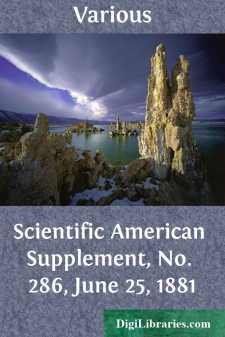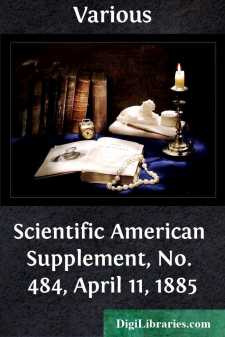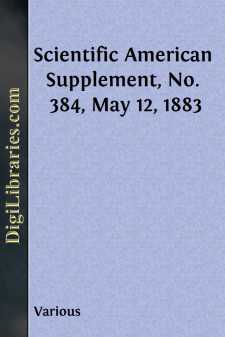Categories
- Antiques & Collectibles 13
- Architecture 36
- Art 48
- Bibles 22
- Biography & Autobiography 813
- Body, Mind & Spirit 142
- Business & Economics 28
- Children's Books 14
- Children's Fiction 11
- Computers 4
- Cooking 94
- Crafts & Hobbies 4
- Drama 346
- Education 46
- Family & Relationships 57
- Fiction 11828
- Games 19
- Gardening 17
- Health & Fitness 34
- History 1377
- House & Home 1
- Humor 147
- Juvenile Fiction 1873
- Juvenile Nonfiction 202
- Language Arts & Disciplines 88
- Law 16
- Literary Collections 686
- Literary Criticism 179
- Mathematics 13
- Medical 41
- Music 40
- Nature 179
- Non-Classifiable 1768
- Performing Arts 7
- Periodicals 1453
- Philosophy 64
- Photography 2
- Poetry 896
- Political Science 203
- Psychology 42
- Reference 154
- Religion 513
- Science 126
- Self-Help 84
- Social Science 81
- Sports & Recreation 34
- Study Aids 3
- Technology & Engineering 59
- Transportation 23
- Travel 463
- True Crime 29
Harper's New Monthly Magazine, Vol. 3, July, 1851
by: Various
Categories:
Description:
Excerpt
OUR NATIONAL ANNIVERSARY.
BY BENSON J. LOSSING.
ON the morning of a brilliant day in October, 1760, the heir apparent to the British throne and his groom of the stole, were riding on horseback near Kew Palace, on the banks of the Thames. The heir was George, son of the deceased Frederick, Prince of Wales; the groom was John Stuart, Earl of Bute, an impoverished descendant of an ancient Scottish chieftain. The prince was young, virtuous, and amiable; the earl was in the prime of mature manhood, pedantic, gay, courtly in bearing, and winning in deportment. He came as an adventurer to the court of George the Second, for he possessed nothing but an earldom, a handsome person, and great assurance; he lived in affluence in the royal household of Frederick, because he played Lothario well not only in the amateur theatre, but in the drawing-room of the princess, and soon became her petted favorite.
The Prince of Wales died, and rumor with her half-lying tongue often whispered in the public ear the suspicion that the earl and the dowager princess were unmindful of the requirements of virtue. Public credulity believed the scandal, and the public mind became troubled because the pupilage of the future sovereign was under the guidance of the shallow earl. He was a tutor more expert in the knowledge of stage-plays, the paraphernalia of the acted drama, and the laws of fashion and etiquette necessary for the beau and the courtier, than in comprehension of the most simple principles of jurisprudence, the duties of a statesman, or the solid acquirements necessary for a reigning prince or his chief adviser. It was evident that the groom of the stole would be the prime minister of the realm when George should possess the throne of his grandfather, and this expectation made virtuous men and true patriots unhappy.
The prince and his inseparable companion had just reined up at the portal of the garden of the dowager, at Kew, when a solemn peal tolled out from the bells of London. While they were listening, a messenger came in haste to the prince and announced the sudden death of the old king. He was soon followed by William Pitt, the greatest commoner in England, the idol of the people, and, as prime minister, the actual ruler of the affairs of the empire. Pitt confirmed the sad tidings, and made preliminary arrangements for proclaiming the accession of George the Third.
EARL OF BUTE.The earl and his pupil remained that day and night at Kew, in company with Doddington and a few other friends, and the next morning rode up to St. James's, in London, to meet the great officers of state. At that interview, Pitt presented the young king with an address to be pronounced at a meeting of the Privy Council. The minister was informed that one had already been prepared. This announcement opened to the sagacious mind of Pitt a broad and gloomy view of the future. He perceived that Bute was to be the ruling spirit in the new cabinet; that he whom he despised for his weakness and illiberality, his pedantic assumption of superior scholarship, and his merited unpopularity with the people, was to be the bosom friend and adviser of the king. Pitt well knew his unfitness, and deplored the consequences. Unwilling to be held in the least responsible for errors which were certain to abound in the administration of affairs, he soon withdrew to his mansion at Hayes, and watched, with all the interest and anxiety of a statesman and patriot, the gradual weaving of the web of difficulty in which the impotent men who surrounded the king, were soon ensnared.
By virtue of his office as groom of the stole, Bute was sworn in a Privy Councilor, and, by degrees he obtained the control of the cabinet. For nearly ten years his unwise advice and defective statesmanship, in the cabinet and in the parlor, led George the Third into many and grave errors, which finally resulted in the loss of the fairest portion of his American possessions. Had Pitt been allowed to guide the public policy and direct the honest but stubborn mind of the king at the beginning of his long reign of half a century, these United States might have remained a part of the British Empire fifty years longer. But that great man, whose genius as a statesman, eloquence and wisdom as a legislator, and whose thorough knowledge of human nature and the past history of the world, made him peerless, and whose administration of government during almost the entire progress of The Seven Years' War, had carried England to a height of prosperity and influence which she had never before approached, was superseded by a fop; his eminent worth was overlooked; his services were apparently forgotten, and he was allowed to retire from office and leave the young sovereign and his government in the hands of weak, crafty, and selfish men. The people venerated Pitt; they despised the very name of Stuart. They deprecated the influence of the king's mother as being unfavorable to popular freedom....












